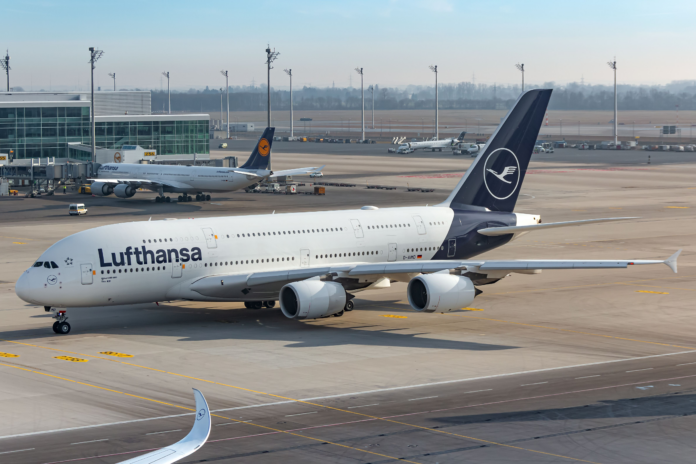Lufthansa Group said it had achieved its strongest quarterly revenue, with the Germany-based airline group expecting travel demand to remain strong in 2024.
Record revenue
The group, which comprises several airlines across Europe, including Austrian Airlines, Lufthansa, Swiss International Air Lines (SWISS), their subsidiaries, and others, as well as Lufthansa Technik, ended Q3 with revenues of €10.7 billion ($11.5 billion), which was an improvement of 5% year-on-year (YoY).
In Q2 2024, Lufthansa Group managed to pass the €10 billion ($10.8 billion) mark for the first time, with the company ending the period with revenues just above that round figure.
Nevertheless, despite ending H1 with a net loss of €265 million ($286.3 million), the group’s nine-month result was a net profit of €830 million ($896.9 million), which was enabled by the impressive €1.095 billion ($1.183 billion) net profit in Q3.
Photo: NYC Russ | Shutterstock
At the same time, Lufthansa Group stated that its quarterly operating margin, or adjusted earnings before interest and taxes (EBIT) margin, decreased by 1.8% YoY in Q3 due to “significant cost increases, particularly in fees, MRO expenses, and personnel.”
On May 1, which was still in Q2, Germany increased its taxes on passengers taking flights by 19%, with Lufthansa Group’s executives, as well as the International Air Transport Association (IATA), criticizing the move.
In Q3, the group launched a turnaround program at Lufthansa, its flagship carrier, with Carsten Spohr, the chairman and chief executive officer (CEO) of Lufthansa Group, reiterating that aircraft delivery delays, punctuality issues at German hubs, and regulatory disadvantages have impacted Lufthansa, the airline.
“By 2026, the measures will have a gross EBIT effect of around [€1.5 billion ($1.6 billion) – ed. note].”
Related Lufthansa Group Is Losing $540 Million A Year To Aircraft Delivery Delays The group’s chief executive estimated the negative financial impact as both Airbus and Boeing have struggled to deliver aircraft on time.
Lufthansa being loss-making
The difficult operating conditions in Germany had resulted in Lufthansa, the airline, being loss-making during the first nine months of 2024.
That was a break from the group’s usual pattern, with the other network and leisure airlines, excluding SWISS, being loss-making. During the first nine months of 2024, Lufthansa’s EBIT was -€36 million ($38.8 million), compared to €748 million during the same period in 2023, marking a massive swing in profitability.
The group’s report reiterated that aircraft delivery delays have forced the airline to reactivate its Airbus A380 fleet, with two A380s set to join a fleet of six aircraft of the type currently operating flights on behalf of the airline.
“[…] the turnaround plan includes shifting more short-haul traffic to more efficient operations that are better aligned with each market segment; further efficiency gains are set to be achieved through network optimization and increasing flexibility and automation.”
In September, airBaltic and Lufthansa Group agreed to extend their wet lease agreement by three years, allowing the latter to wet lease up to 21 additional (five during the winter) Airbus A220-300 aircraft from the former.
Photo: Jokue-photography | Shutterstock
While sources have indicated that the group was looking to acquire a stake in the Latvian airline, wet leasing the additional capacity on short-haul routes not only allows the group to circumvent aircraft delivery delays but also to potentially introduce cheaper-to-operate aircraft, even if they are flown by another airline’s crews.
Nevertheless, SWISS, Austrian Airlines, Brussels Airlines, and Eurowings had positive EBITs, yet the financial report painted a worrying picture: apart from Eurowings, the three aforementioned carriers’ EBIT had decreased YoY.
Lufthansa Group admitted that while it grew its capacity in the first nine months of the year – by 10% YoY, measured in available seat kilometers (ASK) – the financial position of passenger airlines had deteriorated significantly.
“[…] particular due to the negative performance of Lufthansa Airlines; this was mainly driven by the decline in yields in the second quarter of 2024 as a result of market-wide capacity growth, the impact of strikes in the first quarter of 2024, and high costs related to flight irregularities in the third quarter of 2024.”
Photo: InsectWorld | Shutterstock
Once again, Lufthansa Group expressed its frustrations with aircraft delivery delays, adding that this has led to considerable financial expenses due to the need to continue operating older aircraft.
Unit revenues dropped 4.6% YoY, primarily due to lower yields and increased compensation payments to its passengers, which increased to €332 million ($358.5 million) compared to €152 million ($164.1 million) a year prior.
The overall adjusted EBIT for all passenger airlines in the group dropped by 54% YoY, while non-adjusted EBIT decreased by 52% YoY.
Remaining positive
Providing an outlook for the remainder of 2024, Lufthansa Group said that it expected demand to remain strong. Current load factors booked for November and December have been well above the levels during the same two months in 2023.
Photo: Tamme Wichmann | Shutterstock
The group noted that demand has remained especially high for premium-class cabins, namely first and business class.
“The Lufthansa Group plans to increase its capacity in the fourth quarter further compared to the previous year. For the full year 2024, it expects a capacity of around 91 percent compared to the pre-crisis level.”
Lufthansa Group concluded that with an expected positive operating result in Q4, the group should achieve an adjusted EBIT of €1.4 billion ($1.5 billion) to €1.8 billion ($1.9 billion).



